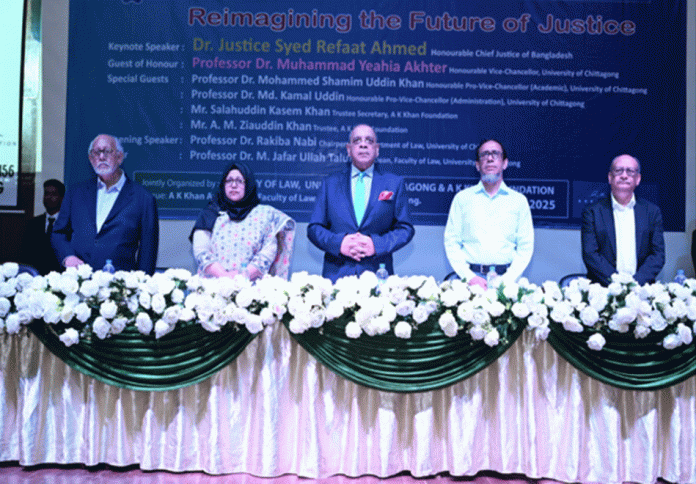
The Chief Justice of Bangladesh, Hon’ble Justice Dr. Syed Refat Ahmed, delivered a powerful keynote address at the 7th A. K. Khan Memorial Law Lecture-2025, held at the auditorium of the Faculty of Law, University of Chittagong. The prestigious seminar, titled “Remaining the Future of Justice”, was jointly organized by the A. K. Khan Foundation and the Faculty of Law, University of Chittagong.
The event commenced at 9:00 AM and was graced by distinguished guests, including the Vice-Chancellor of the University of Chittagong, Professor Dr. Yahya Akhtar, who attended as the Guest of Honour. The program was presided over by Professor Dr. M. Zafrullah Talukder, Dean of the Faculty of Law. The seminar saw the attendance of a wide range of stakeholders from the legal and academic communities, including jurists, lawyers, faculty members, students, and other prominent figures associated with Chittagong University.
At the outset of his address, Chief Justice Dr. Syed Refat Ahmed paid homage to two iconic figures in the nation’s legal history — his predecessor, Hon. Justice Mohammad Ibrahim of the then Dhaka High Court, and the visionary philanthropist A. K. Khan, for whom the memorial lecture is named. Their legacies, he noted, continue to inspire current reform efforts in the justice sector.
A major focus of the Chief Justice’s speech centered around the Judicial Reform Roadmap, officially announced on September 21, 2024. Emphasizing the three foundational pillars of judicial independence, administrative autonomy, and procedural efficiency, he outlined the significant progress already achieved under his leadership.
He proudly shared that the formation of two landmark constitutional bodies — the Supreme Judicial Appointments Council and the Supreme Judicial Council — has ensured that the appointment and removal of judges of the High Court remain completely independent from both the executive and legislative branches.
Additionally, the Chief Justice confirmed that the establishment of a Judicial Secretariat under the Supreme Court is nearing completion. Once operational, it will serve as a vital institutional structure for ensuring full administrative autonomy of the judiciary. A nationwide transfer and posting policy for judges, designed to enhance fairness, transparency, and consistency, has also been submitted to the government.
The Chief Justice detailed the key initiatives already implemented under his tenure, including: The issuance of 12-point anti-corruption directives for the judiciary. Introduction of two helpline services at the Supreme Court to support litigants. Launch of a paperless company bench to improve efficiency. Implementation of a digital requisition system in both the Appellate and High Court Divisions. Development of a case tracking dashboard for enhanced case management. Updating of personal data sheets (PDS) of suspended judges since 2015.
He also disclosed that the Supreme Court has formally recommended the establishment of specialized courts, including children’s courts, electricity courts, and other sector-specific judicial bodies. These proposals are currently under government review.
In a major reform initiative aimed at bolstering the business environment, the Chief Justice revealed that plans are underway to establish specialized commercial courts at the district level. He noted that the European Union has shown strong interest in supporting this move, seeing it as a critical step in streamlining the resolution of commercial disputes in Bangladesh.
He emphasized that these reforms are not isolated measures, but part of a “constitutional renaissance” intended to restore and reinforce the dignity, autonomy, and integrity of the judiciary. He declared that judicial independence is fundamental to sustainable sectoral reform, noting, “If the judiciary is not independent, no reform initiative can be sustained.”
To promote the reform message across the nation, Justice Ahmed stated that he has personally visited all divisions of the country to engage with district court judges and legal professionals. Their enthusiastic response, he said, underscores a collective commitment to judicial transformation.
International development partners including the United Nations Development Programme (UNDP), United Kingdom, European Union, and Sweden have all pledged their continued support since December 2024 to help implement the reform roadmap.
Turning to contemporary challenges, the Chief Justice spoke at length about the impact of rapid technological advancement on the justice system. He noted that society is witnessing a shift in the nature of crime, with traditional offenses increasingly migrating to digital platforms such as social media and the internet.
He acknowledged the complexity of drafting effective legislation to counter cybercrime, stating, “The digital world presents new challenges, where the balance between regulation and fundamental rights, especially freedom of expression, must be handled with utmost care.”
In closing, the Chief Justice underscored the responsibility of the judiciary to evolve alongside society, saying that only through continuous reform and technological adaptation can justice be effectively delivered in a rapidly changing world.

